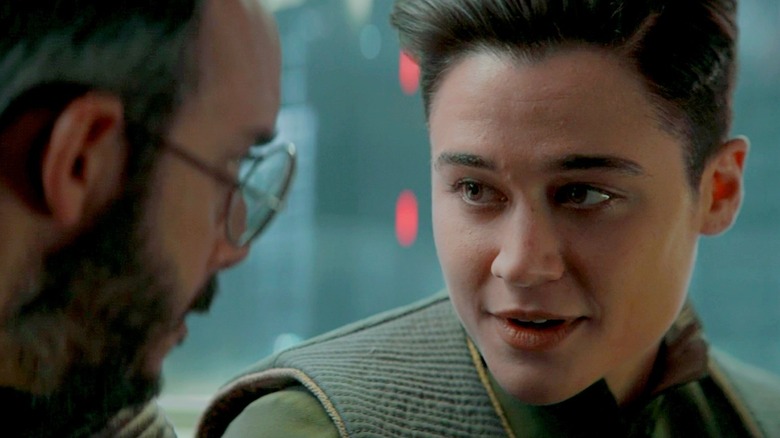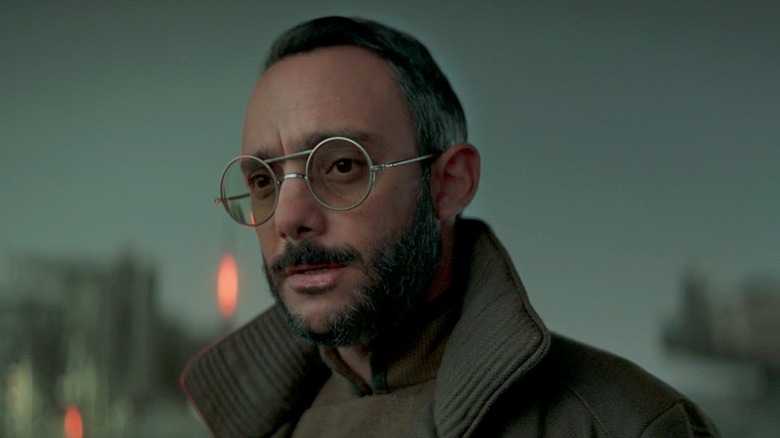The Mandalorian's New Republic Has A Disturbing Real-Life Parallel
This post contains spoilers for "The Mandalorian" season 3, episode 3, "The Convert."
"Star Wars" can't help but serve as a mirror for the world. Sometimes it's deliberate, like when George Lucas wrote "A New Hope" as a response to Richard Nixon's presidency and the Vietnam War. Other times, a galaxy far, far away is ahead of the curve, like when Lucas was writing his prequel trilogy about the rise of the Galactic Empire, unaware that 9/11, the War on Terror, and the Patriot Act were all right around the corner.
More recently, the Disney+ TV shows "Andor" and "The Bad Batch" have picked up that baton, drawing clear parallels between life under the Empire and neofascism in the 21st century. By comparison, "The Mandalorian" takes place five years after the Empire's fall and examines how societies rebuild themselves in the aftermath of war. In the season 3 premiere, we saw that the planet Nevarro has done precisely that, going from a Mos Eisley-styled wretched hive of scum and villainy to a prosperous planet that, as /Film's Bryan Young observed in his review, "looks more like Disneyland."
Expanding on that theme, season 3, episode 3, "The Convert," shows us what Coruscant is like in the early days of the New Republic, and it's ... not great, Bob. In fact, from the vantage points of the citizens on the ground (both the aristocracy and working class), there's not a whole lot of difference between this new galactic bureaucracy and the old one. As with other "Star Wars" projects, though, this idea has a distressing real-life analogue: that of Germany post-World War II.
The De-Empirification of Coruscant
In July 1945, shortly before WWII officially ended the following September, the leaders of the Soviet Union, the U.S., and Britain gathered at the Potsdam Conference to solidify an Allied initiative that became known as the "Denazification" of Germany and Austria. Their intention, as the term suggests, was to both demilitarize and democratize the countries in order to rid them of Adolf Hitler and the Nazi Party's influence on every societal level. However, that also included repurposing the tools and weapons of the Nazi regime. Perhaps most infamously, many former concentration camps (like the one at Buchenwald) were converted into detention camps or "special camps" for Nazis by the People's Commissariat for Internal Affairs, aka the NKVD, in the Soviet-occupied zones of Germany.
It's not difficult to recognize the parallels between the ethical compromises made as part of the Denazification process and what's happening on Coruscant during "The Convert." The New Republic frequently professes its commitment to wiping out all traces of the Empire, yet it's basically reusing the Imperials' tactics of intimidation and encouraging civilians to follow their rules without question (but being more polite about it). Indeed, the theme of recycling a fascist regime's assets for "good" is brought to the surface when Dr. Penn Pershing (Omid Abtahi) admits he doesn't get why the Empire's stuff in general (including its powerful Star Destroyers) is being destroyed or decommissioned.
Of course, Dr. Pershing winds up learning his lesson the hard way when he's subjected to the "friendlier" version of the Mind Flayer, a notorious Empire torture device that, as we see here, has been refashioned by the Republic as a "non-invasive experimental treatment." All it takes is one scheming former Imperial officer, and suddenly that "non-invasive experimental treatment" is transformed into a weapon once more.
The ethics of cloning
Speaking of Dr. Pershing, his whole speech about the applications of cloning and his research into how to, essentially, get rid of "bad" genes brings another popular Nazi concept to mind: Eugenics. The term itself was coined in the late 19th century by Francis Galton, who advocated for the selection of heritable traits that would allow "the more suitable races or strains of blood a better chance of prevailing speedily over the less suitable." Galton's concepts were, to put it as politely as possible, a fundamentally racist and ableist misrepresentation of Charles Darwin's theory of natural selection and observations of evolution. Yet, thanks to the popularity of Social Darwinism and the idea of "survival of the fittest" (a phrase that was coined by Herbert Spencer, not Darwin), Eugenics was treated as a serious science up until the first half of the 20th century.
Despite being employed by Adolf Hitler and the Nazis to support their genocide against various marginalized groups during the Holocaust (including members of the Jewish, LGBTQ+, and Romani communities), Eugenics somehow has a disturbing number of proponents well into the 21st century. No, I didn't use the word "somehow" on accident either. It's quite apparent the larger story thread involving cloning and the Imperials' interest in it on "The Mandalorian," which goes back to season 1, is all part of the show's efforts to build up to Palpatine cloning himself and returning from the "dead" in the "Star Wars" sequel trilogy. Thanks to "The Bad Batch," we also know that Palpatine himself recognized the untapped potential of cloning as far back as the early days of the Galactic Empire. Once again, the unnerving similarities between the "Star Wars" universe and the real world are all too evident.
Operation (Space) Paperclip
If you're like me, though, there's one parallel to real-life history that may've jumped out to you the most while watching "The Convert." That would be the way the New Republic is repurposing former members of the Empire, like Dr. Pershing and his new "pal" Elia Kane (Katy M. O'Brian), with the Amnesty rehabilitation program. The whole thing immediately brought Operation Paperclip to my mind, no doubt in part because I've better familiarized myself with the program and the (in this case, direct) role it looks to play in another Lucasfilm project: "Indiana Jones and the Dial of Destiny."
A covert and decidedly controversial undertaking, Operation Paperclip unfolded from 1945 to 1959 and saw the U.S. government take in 1,600 German scientists (along with their families) who had been members of the Nazi party during WWII. The intent was to have these individuals assist in the development of biological and chemical weapons for the Cold War, while at the same time providing NASA with the information they needed to win the Space Race. Officially, then-U.S. President Harry Truman forbid the hiring of former Nazis or Nazi supporters with known criminal records for the program ... but, as you probably guessed, government officials worked around that by quietly removing evidence of war crimes from the scientists' records.
For as much as Dr. Pershing claims he personally acted with the best intentions while serving the Empire (assuming you believe him), this episode of "The Mandalorian" makes it crystal-clear other former Imperials did not. Just as we're dealing with programs like Operation Paperclip and the role they played in paving the way for modern neofascism, the New Republic will pay for its mistakes in how it dealt with former Imperials soon enough.
"The Mandalorian" premieres new episodes Wednesdays on Disney+.



